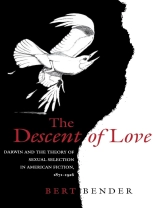Upon its publication in 1871, Charles Darwin’s The Descent of Man and Selection in Relation to Sex sent shock waves through the scientific community and the public at large. In an original and persuasive study, Bert Bender demonstrates that it is this treatise on sexual selection, rather than any of Darwin’s earlier works on evolution, that provoked the most immediate and vigorous response from American fiction writers. These authors embraced and incorporated Darwin’s theories, insights, and language, creating an increasingly dark and violent view of sexual love in American realist literature.
In The Descent of Love, Bender carefully rereads the works of William Dean Howells, Henry James, Elizabeth Stuart Phelps, Sarah Orne Jewett, Kate Chopin, Harold Frederic, Charles W. Chesnutt, Edith Wharton, and Ernest Hemingway, teasing from them a startling but utterly convincing preoccupation with questions of sexual selection. Competing for readership as novelists who best grasped the ‘real’ nature of human love, these writers also participated in a heated social debate over racial and sexual differences and the nature of sex itself. Influenced more by The Descent of Man than by the Origin of Species, Bender’s novelists built upon Darwin’s anthropological and zoological materials to anatomize their character’s courtship behavior, returning consistently to concerns with physical beauty, natural dominance, and the power to select a mate.
Bringing the resources of the history of science and intellectual history to this, the first full-length study of the impact of Darwin’s theories in American literature, Bender revises accepted views of social Darwinism, American literary realism, and modernism in American literature, forever changing our perceptions of courtship and sexual interaction in American fiction from 1871 to 1926 and beyond.
Mengenai Pengarang
Bert Bender is Professor of English at Arizona State University.












